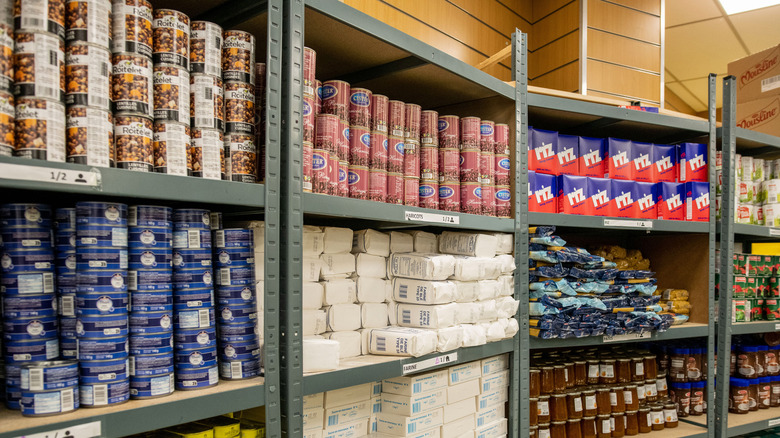Canned Food Is The Next Big Grocery Item To Face Inflation
If you've bought pretty much anything in the last couple of years, you know that inflation is everywhere, especially on the shelves of our grocery stores. Last summer, food inflation was at a 40-year high, as food prices increased 10.4% (via BLS). While inflation has started to fall slightly in 2023, notable disruptions in the supply chain have sent the prices of certain items into the stratosphere. Between 2022 and 2023, the prices of essential items such as frozen vegetables, flour, and margarine all rose by nearly 20% or higher.
A different sort of disruption could soon impact some of the most historically affordable products in the grocery store: canned goods. In a twist, it's not the food inside the cans that would push prices up, but the material used to make the cans themselves: tinplate steel. Proposed tariffs on the product introduced by the Ohio-based steel company Cleveland-Cliffs would be as high as 300%, punishing imports from major tinplate-producing countries including China, Germany, and South Korea.
According to research by the Consumer Brands Association (CBA), the consequences of these tariffs would be serious, raising the burden on consumers who are already over-paying for essential goods. In the end, this is projected to increase prices by up to 30% on canned products, which would mean up to a 58-cent price hike per can. President of the Can Manufacturers Institute Robert Budway spoke out against the tax, saying it will "harm consumers...who rely on affordable and accessible canned foods."
There's no need for panic
Substantial tariffs on aluminum and steel were part of former President Donald Trump's "America First" trade policy, aimed to boost American industry and create jobs, and have been largely maintained by Biden. American steel manufacturers now advocate for new tariffs on tinplate steel to further diminish competition from foreign imports. However, a Forbes editorial argues that high tariffs are nothing but a cash grab at consumers' expense, and foreign tinplate steel fills a critical void in the U.S. market for can-makers.
While Cleveland-Cliffs claims the tariffs will benefit American jobs, the economic impact studies found that thousands of manufacturing jobs would actually be put at risk by the move. According to CBA's partner, Trade Partnership Worldwide, import costs of other related products, like empty cans and canned food from China, are also expected to rise as a result of the policy.
Many of the factors that boosted food prices this past year have been out of political control. The historic bird flu outbreak led to eye-popping egg and poultry prices, while flooding and extreme weather in California's Central Valley impacted produce (via Supermarket News). That said, this particular challenge to canned goods prices is within political control. To those looking to stock their pantries, panic would be premature, as the tariffs have yet to be implemented. Plus, food inflation on the whole is likely to continue its cool down.

